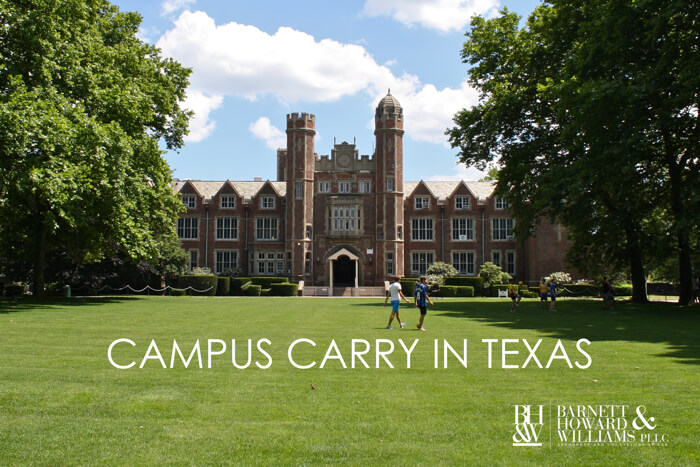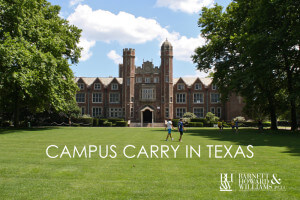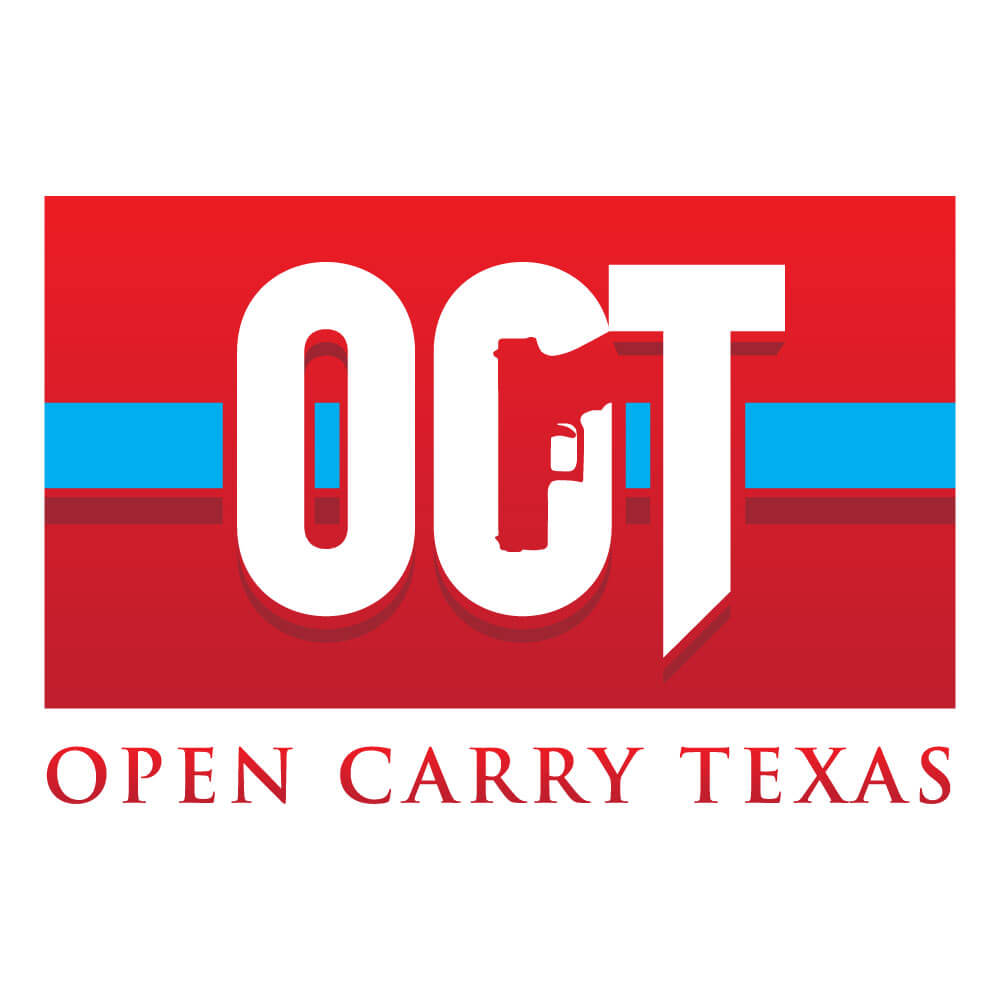
What is the New Campus Carry Law in Texas and What Does it Mean to Me?
 Whether you love it or hate it, Campus Carry is coming to a college campus near you, and if you are a CHL holder, you need to know how to comply with the law. After lengthy debates in both houses of the Texas Legislature, Governor Greg Abbott signed Senate Bill 11 (“Campus Carry”) into Texas law on June 1, 2015. Campus Carry will go into effect on August 1, 2016 on the 50th anniversary of the University of Texas sniper shooting— one of the first mass murders on a college campus in the United States.
Whether you love it or hate it, Campus Carry is coming to a college campus near you, and if you are a CHL holder, you need to know how to comply with the law. After lengthy debates in both houses of the Texas Legislature, Governor Greg Abbott signed Senate Bill 11 (“Campus Carry”) into Texas law on June 1, 2015. Campus Carry will go into effect on August 1, 2016 on the 50th anniversary of the University of Texas sniper shooting— one of the first mass murders on a college campus in the United States.
Who Can Carry a Handgun on a College Campus Under the Campus Carry Law?
Campus Carry permits all Concealed Handgun Licensees who are at least 21 years old, have passed state and federal criminal background checks, have successfully completed a firearms proficiency test and have completed Department of Public Safety-mandated training and education, to carry firearms inside of buildings belonging to public universities and some private institutions of higher education. The new legislation, however, does not mean open carry by anyone, anywhere, any time on all property owned by a public or private university. CHL licensees must take great care to research and to understand the limits of the Campus Carry law and how it impacts the way handguns are carried and stored, or potentially face legal consequences.
Can the Universities in Texas Make Their Own Rules With Campus Carry?
Campus Carry allows institutions of higher education to establish policies governing the storage of handguns by CHLs in dorms and residential facilities. Public universities may also create policies around athletic venues and events, deeming them off-limits to CHL licensees. Under current Texas law, bars, hospitals, churches, and public schools K-12 are off-limits to CHL licensees and will remain off-limits under Campus Carry—and it is important to note that most large public university systems have a teaching hospital, a K-12 practicum experience at public school, a chapel, or are near campus bars. Moreover, schools may create “no-gun zones” or “exclusion zones,” but must provide effective notice about such zones. Therefore, it is extremely important for those with a CHL to know exactly which areas are permitted to have handguns, which are not, and to make plan for storage it if the CHL licensee needs to go into an off-limits area. Students should carefully read their university’s Student Handbook and Campus Code of Conduct for more information.
Campus Carry removes criminal prohibitions in the Texas Penal Code on the possession of concealed handguns by concealed handgun licensees on the campuses. The new law provides institutions of higher education with immunity from liability for actions of CHLs on campus. Campus Carry mandates that an institution of higher education widely distribute the rules to the institution’s students, staff and faculty, including prominently publishing such provisions on the school’s website, and provide effective notice of the areas that are “exclusion zones.” Parents of college students may feel concerned with the new law and campus procedures.
The legislature granted rule-making authority to the presidents of the university system to create campus rules and policies pursuant to S.B. 11, with the only stipulation being that public institutions of higher learning may not “circumvent the intent” of Campus Carry by “imposing administrative bans and sanctions on CHLs on their campuses.” In order to comply with S.B.11, institutions of higher learning must submit a report every other year to the state legislature and to the standing committees that describe the campus rules and policies concerning CHL licensees and the schools must explain the reason the administration has established the provisions. Residents who live in college towns (even if they are not students) should also learn about Campus Carry and the implications of being a CHL at a campus library, sporting event, artistic venue, or even the university hospital.
This is no doubt a very interesting time for policy-making in Texas. Please note that this article is intended for informational purposes only and is subject to change as each public university system and private university determines campus policies based on S.B. 11. This article does not constitute or substitute legal advice. If you need legal advice, please contact our office at (817) 993-9249 for a free consultation.
For more information, see also the full Campus Carry Law, including a Bill Analysis and Fiscal Note or see our Frequently Asked Questions below.
Frequently Asked Questions About Texas Campus Carry
What is Campus Carry?
Campus Carry refers to legislation, Senate Bill 11, signed into law last summer. Campus Carry will make it possible for licensed gun owners, over 21, to carry handguns onto public (and some private) institutions of higher education, in compliance with individual university policies.
When will Campus Carry Take Effect?
Campus Carry will take effect on August 1, 2016—at the beginning of the 2016-2017 academic year.
Do I have to have a Concealed Handgun License (“CHL”) to carry my handgun?
Yes. Campus Carry mandates that all gun owners must:
(1) pass federal and state background checks;
(2) be 21 years old (unless in the military);
(3) complete a firearms proficiency test; and,
(4) complete Department of Public Safety-mandated training and education.
It will be extremely important for every student with a CHL, to know exactly where to go with your handgun and to plan for where you will be able to legally store it if you must go into an off-limits area. Read your Student Handbook and Campus Code of Conduct for more information.
Will Professors be able to carry guns?
Yes. Professors, administrators, faculty, staff and visitors may carry under the Campus Carry law, provided they are in compliance with the law and campus policies.
Does a private school have to follow Campus Carry?
Maybe. Private institutions may establish policies that prohibit CHLs. So far, the following schools have “opted out” of Campus Carry.
- Rice University
- Texas Christian University (TCU)
NOTE: This information is subject to change and it is up to each student, to know if your school has opted out.
Can a student at a public university take a gun anywhere on campus?
Not necessarily. Campus Carry allows institutions of higher education to establish policies governing the storage of handguns by CHLs in dorms and residential facilities. The public university may also create policies around athletic venues and events, as off-limits to CHLs. Under current Texas law, bars, hospitals, churches, and public schools K-12 are off-limits to CHLs and will remain off-limits under Campus Carry—and most large public university systems have a teaching hospital, a K-12 practicum experience at public school, a chapel, or are near campus bars. Schools may create “no-gun zones” or “exclusion zones,” but must provide effective notice about such zones.
Fort Worth Criminal Defense Attorneys
Barnett Howard & Williams PLLC is a criminal defense law firm located in Fort Worth, Texas. Our attorneys handle all felony and misdemeanor charges in the Fort Worth, Tarrant County area. If you have questions about this post or need more information about Campus Carry, please contact us at (817) 993-9249.


 Texans love their guns and many folks in Texas are excited about the new “Open Carry” laws that were passed this year. Some people imagine a wild west where handguns are worn on the hips of everyone in town. Other are terrified that gun-related incidents will increase. Well, the new open carry laws do not come without their rules.
Texans love their guns and many folks in Texas are excited about the new “Open Carry” laws that were passed this year. Some people imagine a wild west where handguns are worn on the hips of everyone in town. Other are terrified that gun-related incidents will increase. Well, the new open carry laws do not come without their rules.





